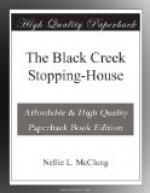Mrs. Corbett went over to see her new neighbor two or three days after. In response to her knock on the rough lumber door, a thin little voice called to her to enter, which she did.
On the bare floor stood an open trunk from which a fur-trimmed pale pink opera cloak hung carelessly. Beside the trunk in an attitude of homesickness huddled the young woman, hair dishevelled, eyes red. Her dress of green silk, embroidered stockings and beaded slippers looked out of place and at variance with her primitive surroundings.
When Mrs. Corbett entered the room she sprang up hastily and apologized for the untidiness of her house. She chattered gaily to hide the trouble in her face, and Mrs. Corbett wisely refrained from any apparent notice of her tears, and helped her to unpack her trunks and set the house to rights.
Mrs. Corbett showed her how to make a combined washstand and clothes press out of two soap boxes, how to make a wardrobe out of the head of the bed, and set the twin sailors at the construction of a cookhouse where the stove could be put.
When Mrs. Corbett left that afternoon it was a brighter and more liveable dwelling. Coming home along the bank of Black Creek, she was troubled in mind and heart for her new neighbor.
“This is June,” she said to herself, “and wild roses are crowdin’ up to her door, and the meadow larks are sittin’ round all over blinkin’ at the sun, and she has her man with her, and she ain’t tired with the work, and her hands ain’t cracked and sore, and she hasn’t been there long enough to dislike the twins the way she will when she knows them better, and there’s no mosquitoes, and she hasn’t been left to stay alone, and still she cries! God help us! What will she do in the long drizzle in the fall, when the wheat’s spoilin’ in the shock maybe, and the house is dark, and her man’s away—what will she do?”
Mrs. Brydon spent many happy hours that summer at the Stopping-House, and soon Mrs. Corbett knew all the events of her past life; the sympathetic understanding of the Irish woman made it easy for her to tell many things. Her mother had died when she was ten years old, and since then she had been her father’s constant companion until she met Fred Brydon.
She could not understand, and so bitterly resented, her father’s dislike of Fred, not knowing that his fond old heart was torn with jealousy. She and her father were too much alike to ever arrive at an understanding, for both were proud and quick-tempered and imperious, and so each day the breach grew wider. Just a word, a caress, an assurance from her that she loved him still, that the new love had not driven out the old, would have set his heart at rest, but with the cruel thoughtlessness of youth she could see only one side of the affair, and that her own.
At last she ran away and was married to the young man, whom her father had never allowed her to bring to see him, and the proud old man was left alone in his dreary mansion, brooding over what he called the heartlessness of his only child.




